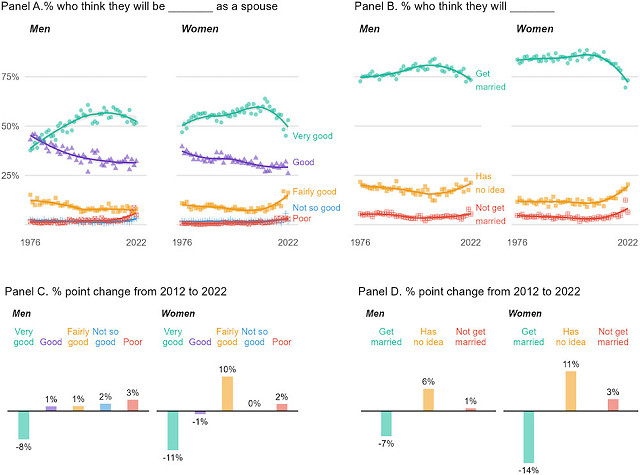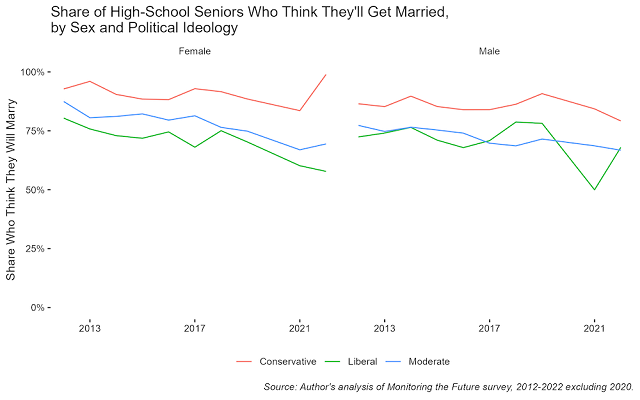Highlights
- A declining share of high school students believe they will ever get married, per the latest Monitoring the Future survey. Post This
- Could declining marriage expectations for American high schoolers track the “Great Awokening”—the rise of left-wing sentiment among young people, especially women, in the past 10 years or so? Post This
- 61% of high school seniors who think they’ll get married, but only 24% of those who think they won't, believe they’d make very good spouses. Post This
In a brief new paper, sociologists Joanna R. Pepin and Philip N. Cohen highlight a new and worrisome trend: Fewer high-school seniors think they will get married one day, per the Monitoring the Future (MTF) survey. Fewer of them think they’d make a good spouse, too.

Source: Pepin, J. R., & Cohen, P. N. (2024). "Growing Uncertainty in Marriage Expectations among U.S. Youth." Socius, 10.
These trends are important in themselves. As Pepin and Cohen point out, the data may portend further declines in the marriage rate. I wanted to float some hypotheses about why they might be happening, too.
First, could declining marriage expectations track the “Great Awokening”—the rise of left-wing sentiment among young people, especially women, in the past 10 years or so? The MTF data show growing liberal identification among young women (rising from about 20 to 30% in the past decade), and other evidence suggests liberals are less likely to marry, so it would make sense for declining marriage intentions to be bundled with these larger phenomena.
I downloaded the MTF data for 2012 through 2022 (except for 2020, which, as Pepin and Cohen warn, is a bit wonky) to take a look. Here’s the share of each sex saying they think they’ll get married, divided by self-identified political leanings, over time.1 If changes in political identification entirely drove the trend above, separating the data this way would make the lines completely flat; or, if self-identified liberals were drifting anti-marriage, the change would be concentrated among them.

Unfortunately, because not every respondent is asked every question, many of the individual points here are based on small sample sizes, creating some awkward lurches.2 But taken as a whole, this shows declining intentions for women even within political ideologies, while the trends for men are a bit flatter. It also, of course, affirms the premise that self-identified liberals are less likely to say they think they’ll marry.
So politics could be part of the explanation, but these results are frankly more boring than I hoped.
As for young people’s opinions about how great of spouses they would make, does the trend reflect changing views of marriage, or is the rise and fall simply an illustration of Millennial narcissism? Jean Twenge has famously shown that narcissistic personality traits rose among the young until about 2008 before declining with the economy. Looking at the trend above, my first thought was not “ugh, those Gen Z-ers hate marriage” but rather “wow, we Millennials were full of ourselves back in the day.”
I’m no psychologist, but from the MTF data I can affirm that, unsurprisingly, people who think highly of themselves in general also tend to believe they would be fantastic spouses. Combining that whole period, only about a third of respondents who thought they were “far below average” in intelligence also thought they’d be “very good” spouses, versus about 60% of those who thought their smarts were above or far above average. Similarly, only 4% of kids who thought they’d make poor workers also believed they’d be very good spouses, versus 69% of those who thought they’d make very good workers.
I don't want to make too much of this quick-and-dirty number crunching. Marriage expectations also go along with high regard for oneself as a spouse, so Pepin and Cohen are correct to see a connection: 61% of those who think they’ll get married, but only 24% of those who think they won't, believe they’d make very good spouses. And, after all, someone who accurately thinks he’s smart and a good worker might entirely reasonably think he’d be a good spouse for many of the same reasons.
But these questions pick up something more than objective reality—specifically, a healthy dose of pompousness—seeing that about 60% of these kids thought they were at least slightly above average in intelligence, while not even 10% thought they were below average.
Ultimately, the uptick in kids saying they don’t think they’ll marry is worrisome; exactly why this is happening is an open question. I wouldn’t launch a federal initiative to inflate Gen Z’s egos just yet—but maybe we should all send the young adults in our life a copy of Brad Wilcox's new book.
Robert VerBruggen is a Manhattan Institute fellow and IFS research fellow.
1. The spectrum is collapsed to liberal, moderate, and conservative. Radicals are grouped in with liberals, and none/don’t know with moderates.
2. For example, in 2022, only 711 people answered whether they thought they’d get married, which in the chart gets divided into two sexes and three political ideologies each, with only 42 conservative women, a mere one of whom didn’t think she’d get married.











